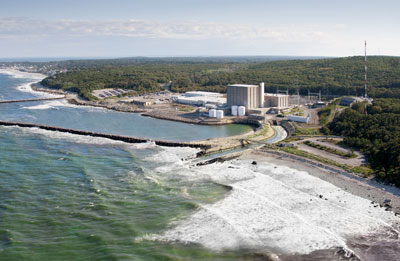PLYMOUTH – A new panel tasked by the state to monitor the lengthy decommissioning process of the Pilgrim Nuclear Power Station met for the first time in Plymouth Wednesday.
At the meeting at Plymouth South High School, the 21-member group heard about some of the initial steps that will be taken as the plant prepares to shutdown permanently in June of 2019. The group will meet quarterly to get updates and provide information to the public on the decommissioning process.
Over the next two years, plant-owner Entergy will have to decide which decommissioning approach to choose: DECON, an immediate dismantling of the station, or SAFESTOR, a deferred decommissioning effort that can be completed over 60 years.
Cost will be a major factor as the company chooses which method to take.
It’s estimated that to begin decommissioning right away via DECON, it would cost in excess of $1 billion. To date, Entergy estimates it has roughly $1 billion available in Pilgrim’s decommissioning trust fund.
“We don’t have the more detailed cost estimate for doing a physical decommissioning of the plant. That will be our job over the next few years,” said Joe Lynch, a top decommissioning official with Entergy. “[The detailed estimate] will make the determination whether we’re capable of going into a DECON scenario or a SAFESTOR scenario.”
“We would not go forward with a DECON, or immediate decommissioning scenario, unless we have enough money to ensure that once we start the project we don’t have to stop mid-way. That would not meet NRC regulations or expectations,” Lynch added.
Entergy opted for the deferred decommissioning option when it closed down Pilgrim’s sister station, Vermont Yankee, in 2014.
The company is currently trying to sell Vermont Yankee to a group called NorthStar, which aims to take over the site and finish decommissioning in an expedited manner.
Entergy says it is in the early stages of exploring a similar option for Pilgrim. Such a plan would require regulatory approval.
Much of the discussion focused on what would become of the spent fuel rods being kept on-site at the Plymouth property.
More than 3,200 fuel rods are being stored at Pilgrim, a station that was initially designed to hold 880 fuel assemblies in wet fuel storage. In 2015, Pilgrim began moving some of the spent assemblies into dry cask storage.
Currently, there is no federal repository for nuclear waste, forcing many plants to keep their own spent fuel on-site. The Trump administration has proposed $120 million as part of its budget to restart the licensing process for the Yucca Mountain Nuclear Waste Repository in Nevada. The Obama administration halted the licensing in 2009.
The panel is tasked with advising the Governor and state legislature and providing information to the public on the decommissioning process.
The group, which includes representatives from several state agencies, businesses and residents, was established by state energy legislation.
Former Cape and Islands State Sen. Dan Wolf, Barnstable Town Councilor John Flores, and Plymouth Selectman John Mahoney are among the sitting members on the panel. Entergy has three representatives serving as part of the working group.
By MATT MCCARTHY, CapeCod.com NewsCenter

























